A MIDWIFE IS LIKE A MOTHER
The essential role of building trust to protect pregnant women against COVID-19

Adama Musah is the lead midwife at Tamale Reproductive and Child Health Center in northern Ghana.
She provides primary health care services to women throughout every phase of their pregnancy journey—from antenatal to postnatal care.
During their visits, pregnant women file one-by-one into Adama’s office where she conducts checkups, writes care plans, monitors and administers medication, such as antimalarials, and offers parents and caregivers advice on the care of newborns

It quickly becomes clear that Adama’s relationship with the women is more than clinical. It’s personal.



Adama’s duties are interrupted by a patient visiting from the neighboring labor ward proudly showing Adama her baby boy she’s given birth to just four hours prior.
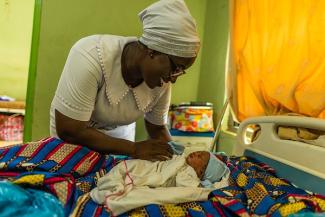
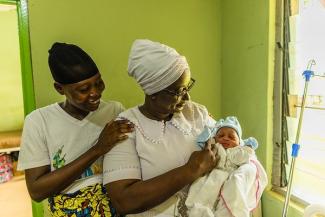
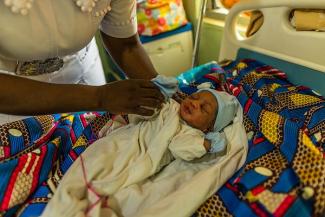
When COVID-19 vaccines reached Ghana in March 2021, per global and country guidance, pregnant women were initially not eligible to receive the vaccine. In January 2022, following World Health Organization guidance, the Ghanaian Ministry of Health announced a new policy encouraging vaccination of pregnant women.
According to Adama, there was much hesitancy and mistrust among pregnant women who wondered why there was a change in the guidance.
Through the U.S. government’s Initiative for Global Vaccine Access (Global VAX), USAID partnered with the Government of Ghana to rapidly vaccinate the people of Ghana against COVID-19 using a variety of strategies, including harnessing the influence of trusted community members like Adama to reach high-risk populations such as pregnant women.
For decades, the U.S.-Ghana partnership has focused on strengthening Ghana's primary health care system.
THANKS TO USAID INVESTMENTS, ADAMA STOOD PREPARED WITH THE SKILLS AND TOOLS SHE NEEDED TO SUPPORT HER COMMUNITY THROUGH THE CHALLENGE AHEAD.
During her personalized check-ups, Adama encourages women to receive their COVID-19 vaccine. If a woman refuses, Adama takes down her information and follows up by phone. Often, these women are amazed that Adama takes the time to call at all. If the patient still declines, Adama continues to follow up, sometimes even visiting patients at their homes. Slowly, her persistence pays off.
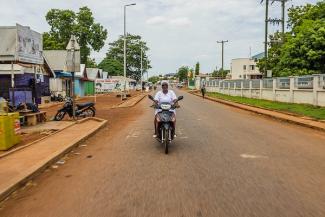
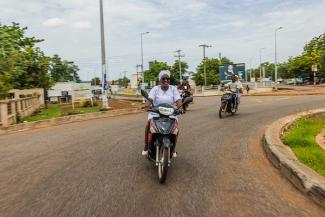
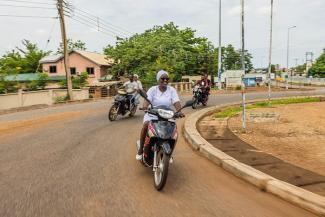
It’s all about trust. I get them to first have confidence in me, and then I can convince them to get vaccinated (against COVID-19),” says Adama.
Adama also follows up with her patients by phone to check if they’ve developed any side effects four times after they leave her clinic - once following day one, again after two days, after one week, and a final call two weeks after they receive their COVID-19 vaccines. Adama credits this personal touch for helping strengthen the trust between her and her patients.
She spoke to me like she was my mother,” says Patience, a client who was initially hesitant to get vaccinated but credits Adama for her decision to eventually get the COVID-19 vaccine. “She made me trust her.”

This extra layer of follow-up means more work for Adama, but she says it’s worth it.
The COVID-19 vaccine “has made me become closer [to my patients] because it has made me do more follow-up,” says Adama. “Instead of closing at 2 p.m., we are closing at 5 p.m. But I don’t want them to miss me because I initiated their care.”



Adama’s person-centered approach to providing care for her patients is already paying off. “Now, I don’t have to talk to them, they come to me,” she says. “They come to me to ask for their booster.”




Learn more about USAID’s work in Ghana. Follow USAID's Mission in Ghana on Facebook and Twitter.
ABOUT THIS STORY
USAID’s investments in Ghana’s primary care system date back decades, and enabled Ghana’s community health officers and midwives to rapidly deploy surveillance, vaccination, and case management to communities when COVID-19 hit. Under the leadership of the Government of Ghana and implemented by the Ghana Health Service, Ghana’s Community-Based Planning and Services model is the bedrock of the primary health system, and has contributed to improvements in health outcomes since its adoption as a national strategy. In 2022, Ghana recorded a 33% decrease in child mortality and 41% decrease in newborn mortality since 2014.
As Ghana begins incorporating COVID-19 vaccination in routine health care systems, trust in health care providers will remain an essential element, and trusted health care workers like Adama will be leading the way to build resilient health systems that support and protect patients against the next emerging threat.
Ghana is a focus country of USAID’s Primary Impact initiative, which works to drive better health outcomes through primary health care, including a focus on strengthening and growing the primary health care workforce. As a long-standing priority country for USAID’s programs to prevent child and maternal deaths, Ghana is poised to share its successes with the world—including, how a strong network of Community Health Officers and midwives can build trust and provide quality preventative care to their communities.
Footnotes
Narrative by Cassie Vasiloff; photos by Bobby Neptune for USAID.


